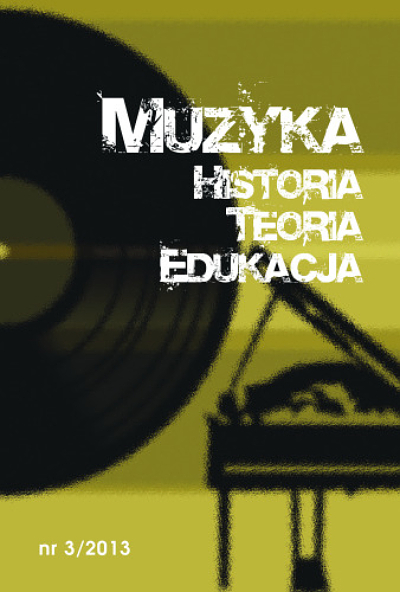Andrzej Koszewski – creator of sacred music
DOI:
https://doi.org/10.34767/MHTE.2013.03.06Abstract
Andrzej Kostrzewski’s rich compositions focus on a cappella choral sacred music. Most of his opuses origin in liturgy and their sacred meaning is versatile. Worth taking into consideration are these emphasizing word-musical connection in spiritual sense as well as their sound virtue. They often become symbolic. One of the most significant religious compositions of Andrzej Kostrzewski is Angelus Domini dedicated to the Pope in his anniversary at the holy See. An interesting arrangement of the opus presents its pleading character. Moreover, many recitatives are implementing time organization characteristic for Gregorian chorale. the word-musical connections are changeable and have extensive theological meaning. there is Gloria Patri included at the end of the opus which makes the opus hymn. Sacral compositions of Andrzej Kostrzewski features association with traditional and innovative resources. his compositions are performed by choirs all over the world as Kostrzewski himself is recognized as one of the most outstanding choral music composer.
References
Dąbek Stanisław, Teologia człowieka wewnętrznego, „Liturgia Sacra” 2005, nr 1.
Instrukcja Episkopatu Polski o muzyce liturgicznej po Soborze Watykańskim II.
Kostrzewska Hanna, Muzyka sakralna – próba definicji, „Musica Sacra Nova” 2007, nr 1.
Obniska Wanda, Amerykański wieczór premier, „Głos Wybrzeża” 20 X 1981.
Pawlak Ireneusz ks., Muzyka liturgiczna po Soborze Watykańskim II w świetle dokumentów Kościoła, Polihymnia, Lublin 2001.
Podhajski Marek (red.), Kompozytorzy polscy 1918-200. II. Biogramy, Akademia Muzyczna im. F. Chopina w Warszawie-Akademia Muzyczna im. S. Moniuszki w Gdańsku, Warszawa-Gdańsk 2005.
Zielińska Lidia, Przewodnik po twórczości Andrzeja Koszewskiego, Wyd. Muzyczne Brevis, Poznań 1993.

